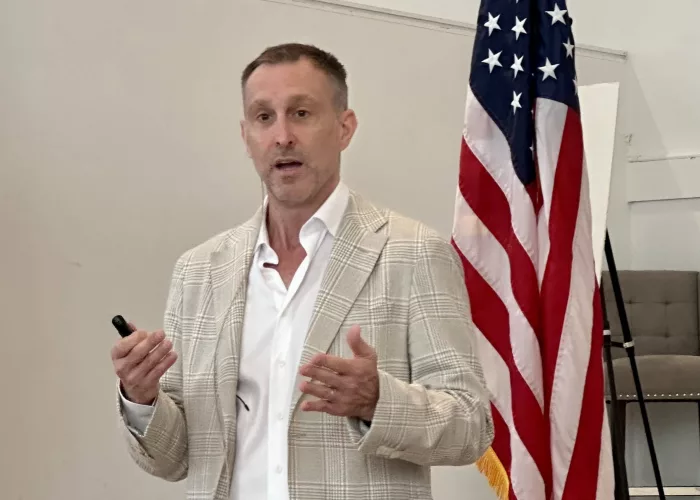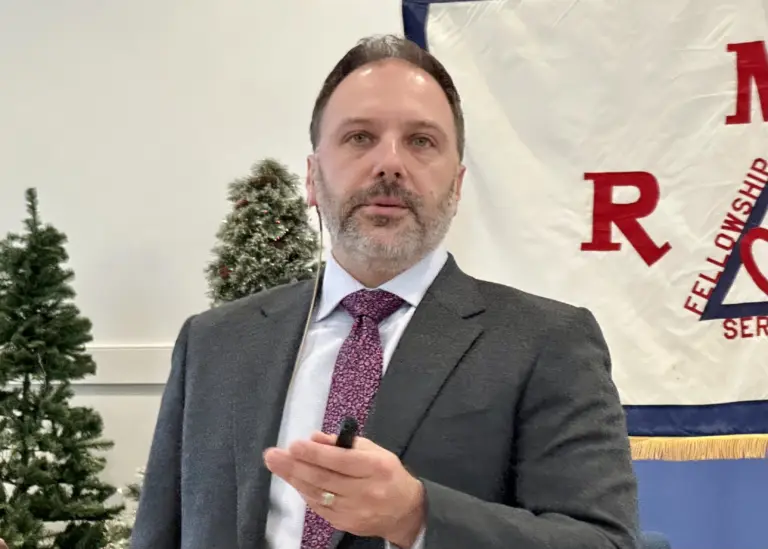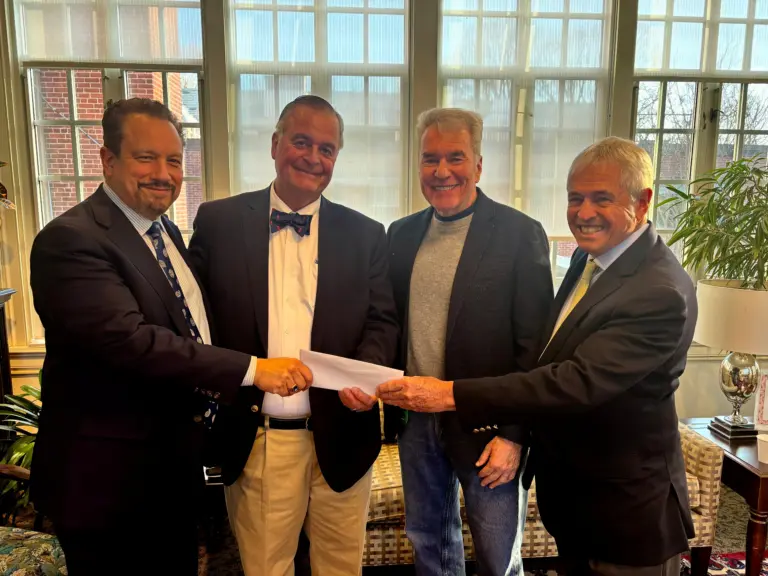
By Arnold Gordon
The June 11th speaker at the Greenwich Retired Men’s Association was Shaun Kelley, a managing director in equity research covering gaming, lodging, and leisure at Bank of America, who offered a compelling deep dive into the burgeoning world of online sports betting. Kelley, who has been with Bank of America for over two decades and consistently ranked among the top equity researchers in his field, shared insights cultivated since he began covering the sector in 2008 – a period he described as “fascinating.”
The seismic shift in the U.S. gambling landscape, Kelley explained, began with the Supreme Court’s 2018 repeal of the Professional and Amateur Sports Protection Act (PASPA). This 1992 federal law, championed by former Senator Bill Bradley of New Jersey, had largely prohibited sports betting nationwide. Its overturning opened the floodgates, allowing individual states to legalize sports wagering. Before this pivotal decision, legal sports betting was confined almost exclusively to Nevada. Today, online sports betting is legal in 38 states, with Missouri expected to become the 39th in November. Kelley clarified the distinction between online sports betting (OSB) and online casino gambling (iGaming), noting that iGaming, which includes mobile access to slot machines and table games, is far less common, and is legal in only five or six states, notably New Jersey, Michigan, and Pennsylvania.
The industry’s growth has been nothing short of exceptional. From effectively zero revenue in 2018, online sports betting surged to nearly $7 billion in 2021 and reached an estimated $21 billion in trailing 12-month revenue by 2024. This explosive expansion significantly outpaced initial forecasts; for instance, DraftKings, one of the industry’s titans, was initially projected to see a market of $10 billion by 2024, a figure that was more than doubled. Looking ahead, FanDuel, another dominant operator, envisions a long-term potential of $70 billion in revenue. Kelley attributed this unexpected acceleration to three primary factors. (1) Rapid state adoption: states legalized online sports betting at an unprecedented pace, with 38 states doing so in just five years, compared to traditional casinos taking nearly 30 years to reach a similar number of states. States, particularly those in the “Rust Belt” facing pension liabilities, viewed it as a crucial tax revenue source. Notable holdouts include Texas, influenced by social conservatism and a lack of revenue need, and California, where a complex landscape of nearly 200 Native American tribes prevents agreement on how to implement legalization. (2) Increased consumer spending: The amount of money gambled per adult continues to rise annually. Kelley observed that the top five states— New York, New Jersey, Illinois, Ohio, and Pennsylvania—generate almost double the revenue per adult compared to other states. (3) Rising “hold rates”: The percentage of each wager the sportsbooks keep has grown, driven by consumer preference for “parlays.” Parlays, or multi-leg bets, effectively transform basic sports bets into lottery-like outcomes, offering the allure of a large payout from a small wager, despite significantly higher odds against the player. This trend is particularly popular among the industry’s core demographic: 18–35-year-old males, who comprise 90% of sports bettors.
While football commands the highest wagers per game, especially on “island games” like Sunday or Monday night NFL matchups, basketball is the most bet-on sport overall due to the sheer volume of games. The fourth quarter, from September through December, sees the vast majority of the industry’s revenue due to football’s seasonality.
Kelley also addressed the inherent risks in the burgeoning industry. While online sports betting hasn’t significantly cannibalized the traditional brickand-mortar casino business, he noted that the latter is experiencing minimal growth, much like broader retail compared to Amazon’s online dominance. A more pressing concern is the societal impact of problem gambling. With increased accessibility, rates of problem gambling are expected to rise, leading to calls for stricter regulation. Kelley cited examples from the United Kingdom, where online casino gambling has been legal longer, including proposals to ban sports sponsorships by gambling companies. The NCAA is also grappling with player proposition bets, which have led to 18-year-old athletes facing harassment on social media for their on-field performance. In terms of market structure, the online sports betting landscape is dominated by DraftKings and FanDuel, collectively holding 70-80% of the market share. Other significant players include MGM, Caesars, and ESPN Bet. Kelley emphasized that these are essentially technology companies, investing between $1-2 billion annually in tech, creating a significant barrier to entry for new competitors. Despite initial heavy losses, companies like DraftKings are now becoming profitable, largely due to economies of scale and operating leverage.
Looking to the future, Kelley highlighted the emergence of prediction markets as a potential disruptor. Platforms like Polymarket and Kalshi, which gained prominence for accurately predicting election outcomes when traditional polls failed, are now moving into sports. These markets operate more like stock exchanges, matching buyers and sellers, rather than traditional “house-backed” sportsbooks. Kelley noted that even platforms like Robinhood are venturing into this space. Shaun Kelley’s colleague Julie Hoover added that sports betting odds are primarily set by data science and algorithms, not by the volume of money wagered. External information suggests that sophisticated arbitrage opportunities exist, though they require considerable mathematical prowess. Kelley also mentioned that the famous author Michael Lewis, known for “Moneyball,” explored issues of sports integrity and information edges in his podcast “Against the Odds.”
The presentation can be viewed by going to the RMA website at https://greenwichrma.org, and clicking on “Speakers.”
The RMA’s upcoming presentation, “A Safe Haven: My Family’s Escape from Nazi Germany to Shanghai” by Henry Tischler, is scheduled for 10:45 AM on Wednesday, June 25, 2025 (note changed time). RMA presentations are held at Christ Church Greenwich, 254 E. Putnam Avenue, Greenwich, CT 06830.
In 1939 Henry Tischler’s family fled Berlin for Shanghai, which for 11 months provided one of the last places Jews could travel to to escape the coming horrors of Nazi Germany. The family spent eight and one-half years there along with 18,000 other refugees who were lucky enough to find this place of limited safety.
Henry was born in Shanghai the day World War II ended and spent the first two-and-a-half years of his life there. In December of 1947 Henry and his family immigrated to the US and started to rebuild their lives. The family had no money or marketable skills and needed the support of relief agencies.
Henry was born in Shanghai the day World War II ended and spent the first two-and-a-half years of his life there. In December of 1947 Henry and his family immigrated to the US and started to rebuild their lives. The family had no money or marketable skills and needed the support of relief agencies. Henry Tischler is a retired professor of sociology, having taught at Framingham State University and Northeastern University. He is the author of numerous sociology textbooks, including 12 editions of Introduction to Sociology, which for 37 years was one of the most widely used introductory sociology textbooks in the country.
To stream the presentation by Henry Tischler at 10:45 AM on Wednesday, June 25, click on https://bit.ly/30IBj21. This presentation will also be available on local public access TV channels, Verizon FIOS channel 24 and Optimum (Cablevision) channel 79.
Note: The views expressed in these presentations are those of the speakers. They are not intended to represent the views of the RMA or its members.
RMA speaker presentations are presented as a community service at no cost to in-person or Zoom attendees, regardless of gender. Any member of the public who would like to receive a weekly email announcement of future speakers should send a request to members@greenwichrma.org. The RMA urges all eligible individuals to consider becoming a member of our great organization, and thereby enjoy all the available fellowship, volunteer, and community service opportunities which the RMA offers to its members. For further information, go to https://greenwichrma.org/, or contact info@greenwichrma.org.




